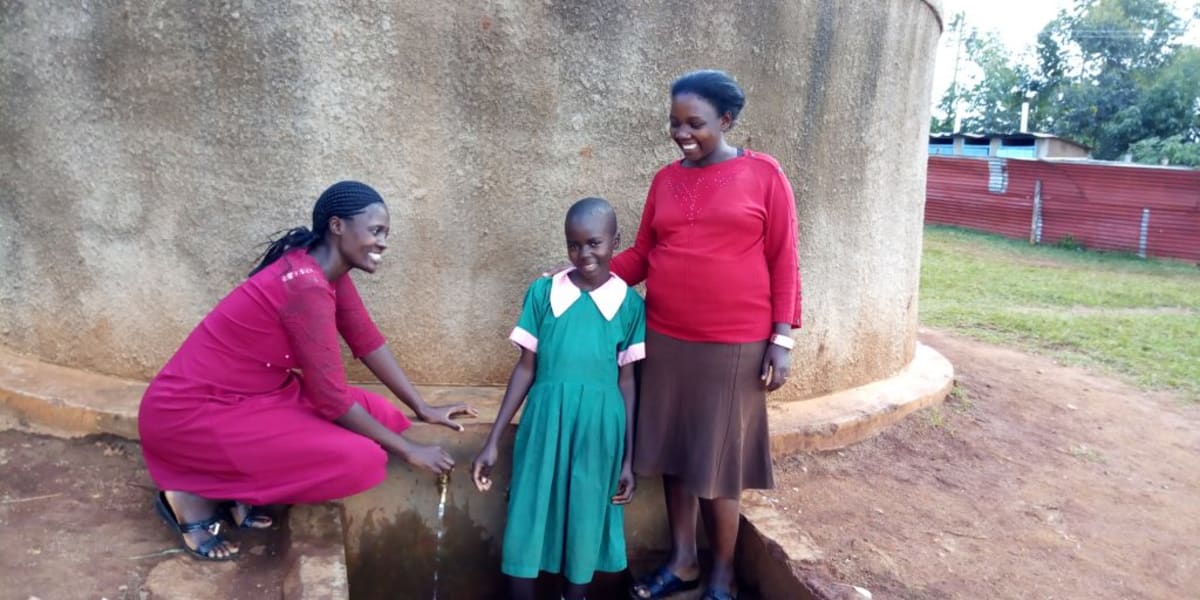A lot of different activities happen during a normal day at Womulalu Primary School. It starts with morning assembly, when students gather outside to listen to announcements from the headteacher. There are bathroom breaks between classes until lunch, which is served on school grounds.
After afternoon classes, groups of students are required to bring five-liter jerrycans to a spring located a half kilometer away from school. Normally, boys are required to fetch the water, and girls are expected to use that water to clean classrooms and latrines. After this, there is another assembly for children to be dismissed.
There are 484 students enrolled, all taught by 16 teachers. The school also employs two support staff.
Water
There is a 6,000-liter plastic tank outside of the classrooms. Between classrooms, some students always head over to the tank to try and get some water. Unfortunately, so much water is needed to run a school with hundred of students, and 6,000 liters is never enough. A teacher always beats students to the tank and restricts access.
Teacher Jonathan Warua said, "These children suffer a lot because they get it really hard to get water from the spring, given that the water tank at the school cannot serve the whole school fully."
The tank is primarily reserved for the teacher's drinking needs and for the kitchen to cook school lunch. If students are thirsty, they are expected to find a group to fetch water with. The closest water source is Womulalu Spring. Though it has a head wall and discharge pipe that makes it easier to fill a bucket with water, the walk back and forth is tiring for these students, and a lot of time is wasted out of the classroom. After drinking this water, students often have to go home because of diarrhea and stomachaches.
Sanitation
There are six latrines for boys and six for the girls. These are too few and the pits are almost too full to use. Students have to wait in long lines for their turn and often miss the beginning of their next class.
There are no hand-washing stations.
Here's what we're going to do about it:
Training
Training will be held for two days. The facilitator will use PHAST (participatory hygiene and sanitation transformation), ABCD (asset-based community development), CTC (child to child), lectures, group discussions, and handouts to teach health topics and ways to promote good practices within the school. The CTC method will prepare students to lead other students into healthy habits, as well as kickstart a CTC club for the school.
Hand-Washing Stations
This CTC club will oversee the new facilities, such as hand-washing stations, and make sure they are kept clean and in working condition. The two hand-washing stations will be delivered to the school, and the club will fill them with water on a daily basis and make sure there is always a cleaning agent such as soap or ash.
VIP Latrines
Two triple-door latrines will be constructed with local materials that the school will help gather. Three doors will be set aside for each gender. And with a new source of water on school grounds, students and staff should have enough to keep these new latrines clean.
Rainwater Catchment Tank
A 50,000-liter rainwater catchment tank will help alleviate the water crisis at this school. The school will also help gather the needed materials such as sand, rocks, and water from the spring for mixing cement. Once finished, this tank can begin catching rainfall that will be used by the school’s students and staff. Students will no longer have to leave the school whenever water is needed.
We and the school strongly believe that with this assistance, standards will significantly improve – and these higher standards will translate to better academic performance for these students.
This project is a part of our shared program with Western Water And Sanitation Forum (WEWASAFO). Our team is pleased to provide the reports for this project (formatted and edited for readability) thanks to the hard work of our friends in Kenya.

 Rainwater Catchment
Rainwater Catchment
 Rehabilitation Project
Rehabilitation Project
































